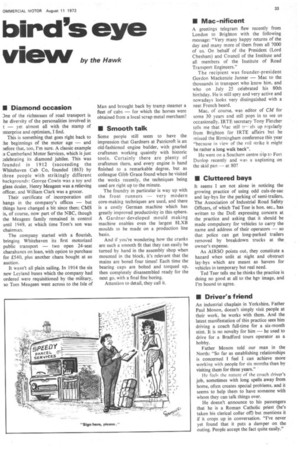bird's eye
Page 35

If you've noticed an error in this article please click here to report it so we can fix it.
view by the Hawk
• Diamond occasion
lie of the richnesses of road transport is he diversity of the personalities involved in t — yet almost all with the stamp of mterprise and optimism, I find.
This is something that goes right back to :he beginnings of the motor age — and Defore that, too, I'm sure. A classic example is Cumberland Motor Services, which is just celebrating its diamond jubilee. This was Founded in 1912 (succeeding the Whitehaven Cab Co, founded 1863) by three people with strikingly different backgrounds: George Cowin was a toy and glass dealer, Henry Meageen was a relieving officer, and William Clark was a grocer.
Their certificate of incorporation still hangs in the company's offices — but things have changed a bit since then; CMS is, of course, now part of the NBC, though the Meageen family remained in control until 1949, at which time Tom's son was chairman.
The company started with a flourish, bringing Whitehaven its first motorized public transport — two open 24-seat charabancs on loan, with option to purchase for £540, plus another chara bought at an auction.
It wasn't all plain sailing. In 1914 the six new Leyland buses which the company had ordered were requisitioned by the military, so Tom Meageen went across to the Isle of Man and brought back by tramp steamer a fleet of cabs — for which the horses were obtained from a local scrap metal merchant!
• Smooth talk
Some people still seem to have the impression that Gardners at Patricroft is an old-fashioned engine builder, with gnarled craftsmen working quaintly with historic tools. Certainly there are plenty of craftsmen there, and every engine is hand finished to a remarkable degree, but as colleague Gibb Grace found when he visited the works recently, the techniques being used are right up to the minute.
The foundry in particular is way up with the front runners — very modern core-making techniques are used, and there is a costly German machine which has greatly improved productivity in this sphere. A Gardner-developed mould making machine enables even the largest 8LXB moulds to be made on a production line basis.
And if you're wondering how the cranks are such a smooth fit that they can easily be turned by hand in the assembly shop when mounted in the block, it's relevant that the mains are bored four times! Each time the bearing caps are bolted and torqued up, then completely disassembled ready for the next go, with a final fine boring.
Attention to detail, they call it.
• Mac-nificent
A greetings telegram flew recently from London to Brighton with the following message: "Very many happy returns of the day and many more of them from all 7000 of us. On behalf of the President (Lord Chesham) and Council of the Institute and all members of the Institute of Road Transport Engineers."
The recipient was founder-president Gordon Mackenzie Junner — Mac to the thousands in transport who know him, and who on July 25 celebrated his 80th birthday. He is still spry and very active and nowadays looks very distinguished with a neat French beard.
Mac, of course, was editor of CM for some 30 years and still pops in to see us occasionally. IRTE secretary Tony Fletcher tells me that Mac still tr— els up regularly from Brighton for IRTE affairs but he missed the Birmingham conference this year "because in view of the rail strike it might be rather a long walk back".
He went on a Southern Centre trip to Fort Dunlop recently and was a naplaninv, on the skid pan—at 80?
• Cluttered bays
It seems I am not alone in noticing the growing practice of using odd culs-de-sac and lay-bys for the parking of semi-trailers, The Association of Industrial Road Safety Officers, of which Ted Teer is hon. sec., has written to the DoE expressing concern at the practice and asking that it should be made compulsory for vehicles to carry the name and address of their operators — so that police can get long-parked trailers removed by breakdown trucks at the owner's expense.
As AIRSO points out, they constitute a hazard when unlit at night and obstruct lay-bys which are meant as havens for vehicles in temporary but real need.
Ted Teer tells me he thinks the practice is doing no good at all to the hgv image, and I'm bound to agree.
• Driver's friend
An industrial chaplain in Yorkshire, Father Paul Moxon, doesn't simply visit people at their work, he works with them. And the latest manifestation of this practice sees him driving a coach full-time for a six-month stint. It is no novelty for him — he used to drive for a Bradford tours operator as a hobby.
Father Moxon told our man in the North: "So far as establishing relationships is concerned I feel I can achieve more working with people for six months than by visiting them for three years."
lie feels the nature of the coach driver's job, sometimes with long spells away from home, often creates special problems, and it seems to help them to have someone with whom they can talk things over.
He doesn't announce to his passengers that he is a Roman Catholic priest (he's taken his clerical collar off) but mentions it if it crops up in conversation. "I've never yet found that it puts a damper on the outing. People accept the fact quite easily."




























































































